Samoa lifts state of emergency over measles epidemic
- Published

The spread of the disease has slowed after a mass vaccination drive
Samoa has lifted a six-week state of emergency, which was put in place amid a measles epidemic that killed 81 people and infected more than 5,600.
Just 200,000 people live on the South Pacific island nation, and vaccination rates are far lower than in neighbouring countries.
Most of those killed in the outbreak were babies and young children.
Infection rates slowed earlier this month after a vaccination drive pushed immunisation rates towards 95%.
According to aid agencies, this is the level required in order to have "herd immunity" against the disease.
Under the emergency orders put in place last month, schools were closed, travel and public gatherings were restricted, and red flags were placed outside the homes of people who hadn't been vaccinated.
How did the disease spread?
Globally, measles cases are on the rise - including in the US and Germany - as parents forego life-saving vaccines because of false, repeatedly debunked theories linking childhood immunisation with autism.
Earlier this year a measles outbreak hit Auckland in New Zealand - a hub for people travelling to and from many small Pacific islands.
In Samoa, low vaccination rates are in part due to the deaths of two children in 2018.
The deaths were wrongly attributed to the vaccination against measles, mumps and rubella (MMR) - but were actually caused by nurses mixing the vaccine with a muscle relaxant instead of water.
But this raised local fears around vaccines, and were exploited by anti-vaccination campaigners - also known as "anti-vaxxers".
Prominent anti-vaxxer Edwin Tamasese was arrested in Samoa earlier this month and charged with incitement against a government order.
Mr Tamamese had posted false theories about measles on Facebook, and instead promoted the use of ineffective remedies to treat the deadly illness - such as using papaya leaf extract and vitamin C.
He also called the government's vaccination programme "the greatest crime against our people".
How does herd immunity work?
- Published19 June 2019

- Published30 September 2019
- Published2 December 2019

- Published20 June 2019

- Published25 December 2019
